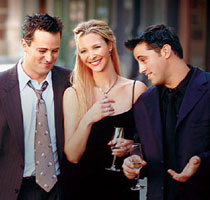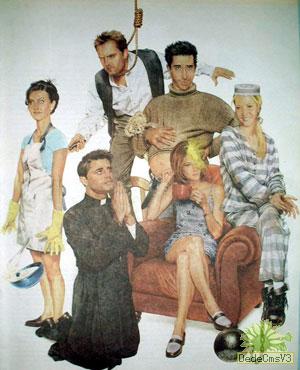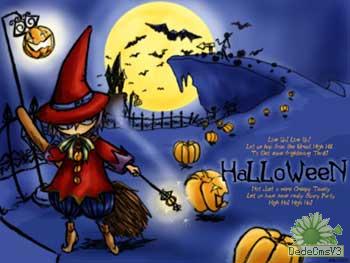-
(单词翻译:双击或拖选)
影片对白 Joey: ...Ninety-five, ninety-six, ninety-seven. See, I told you! Less than a hundred steps from our place to here.
Joey: ...Ninety-five, ninety-six, ninety-seven. See, I told you! Less than a hundred steps from our place to here.
Chandler: You got waaaay too much free time.
Joey: Hey! Here's the birthday boy! Ross, check it out: hockey tickets, Rangers-Penguins, tonight at the Garden, and we're taking you.
Chandler: Happy birthday, pal1!
Joey: We love you, man.
Ross: Funny, my birthday was seven months ago.
Joey: So?
Ross: So, I'm guessing you had an extra ticket and couldn't decide which one of you got to bring a date?
Chandler: Well, aren't we Mr. "The glass is half empty."
Ross: Oh my God, oh --- is today the twentieth, October twentieth?
Monica: Oh, I was hoping you wouldn't remember.
Ross: Ohhh.
Joey: What's wrong with the twentieth?
Chandler: Eleven days before Halloween... all the good costumes are gone?
Ross: Today's the day Carol and I first... consummated2 our physical relationship. Sex... You know what, I-I'd better pass on the game. I think I'm just gonna go home and think about my ex-wife and her lesbian lover.
Joey: The hell with hockey, let's all do that!
Chandler: C'mon, Ross! You, me, Joey, ice, guys' night out, c'mon, whaddya say, big guy, Huh? Huh? Huh?
Ross: What are you doing?
Chandler: I have no idea.
Joey: C'mon, Ross!
Ross: Alright, alright, maybe it'll take my mind off it. Do you promise to buy me a big thumb finger?
Chandler: You got it.
Rachel: Look-look-look-look-look, my first paycheck! Look at the window, there's my name! Hi, me!
Phoebe: I remember the day I got my first paycheck. There was a cave in one of the mines, and eight people were killed.
Monica: Wow, you worked in a mine?
Phoebe: I worked in a Dairy Queen, why?
Rachel: God, isn't this exciting? I earned this. I wiped tables for it, I steamed milk for it, and it was totally-not worth it. Who's FICA? Why's he getting all my money? I mean, what- Chandler, look at that.
Chandler: Oh, this is not that bad.
Joey: Oh, you're fine, yeah, for a first job.
Ross: You can totally, totally live on this.
Monica: Yeah, yeah.
Ross: Oh, by the way, great service tonight.
All: Oh! Yeah!
 Guys: Hockey! Hockey! Hockey.
Guys: Hockey! Hockey! Hockey.
Leslie: Rachel?
Rachel: Oh my God!
Monica: I swear I've seen birds do this on Wild Kingdom.
Rachel: What are you guys doing here?
Kiki: Well, we were in the city shopping, and your mom said you work here, aaand it's true!
Joanne: Look at you in the apron3. You look like you're in a play.
Rachel: Look at you, you are so big I can't believe it!
Leslie: I know. I know! I'm a duplex.
Rachel: So what's going on with you?
Joanne: Well, guess who my dad's making partner in his firm?
Kiki: And while we're on the subject of news...
Phoebe: Look, look, I have elbows!
妙词佳句,活学或用
1. way too much
意思是“太多”。其中的“way”是副词,表示“远远地,大大地,非常”。例如:Are we teaching our kids way too much about sex? Or not nearly enough? 我们为孩子提供的性教育是太多了?还是远远不够?电影中的 You got waaaay too much free time.意思是“你的闲工夫太多了”。
2. check something out
意思是“查看,检查” ,往往表示让对方看看某种令人兴奋的事物。例如:Be sure to check out our FAQ if you have further questions! 如果你还有疑问,请查看我们的“常见问题”栏目!电影中的 Ross, check it out: hockey tickets, Rangers-Penguins, tonight at the Garden, and we're taking you. 意思是“罗斯,看呐:冰球票,骑兵队对企鹅队,今晚在花园体育场,一块去吧。”
3. pass on
意思是“放过……不要,放弃”,通常用在拒绝对方的提议时。例如:I would pass on the trip. I got tons of things to do at the weekend. 我周末有一大堆的事要做,旅游我就不去了。电影中的You know what, I-I'd better pass on the game. 意思是“这么说吧,球赛我还是免了。”
4. the hell with
意思是“让……见鬼去吧。”例如:The hell with democracy, let's hire a king. 去他的民主,我们雇一个国王吧。电影中的 The hell with hockey, let's all do that! 意思是“让冰球见鬼去吧,我们都那样做(指罗斯回忆与前妻在一起的时光)!”
5. take one's mind off
意思是“转移某人的注意力。”例如:I can't take my mind off of you for the last summer vacation. 整个暑假我满脑子想的都是你。电影中的Alright, alright, maybe it'll take my mind off it. 意思是“好吧,好吧,也许它会使我转移注意力。”
6. live on
意思是“靠……过活。”例如:Don't live on the past. You should look ahead. 你应该朝前看,不要老想着过去。电影中的 You can totally, totally live on this. 意思是“你完全,完全可以靠这个(工资)过活。”
文化面面观
Halloween 万圣节
在西方,万圣节(每年10月31日)被认为是死去的祖先的灵魂回家的日子。这些灵魂会寻找活人附身,所以所有人都打扮成鬼魂的模样而且喧闹地游行,以吓跑鬼魂。常见的习俗有 trick or treat和南瓜灯等。一到万圣节,孩子们就穿着古怪的衣服,挨家挨户去敲门,一边说“trick or treat”。这时主人就会打开门,将一些糖果分发给孩子们。
 The word itself, "Halloween," actually has its origins in the Catholic Church. It comes from a contracted corruption4 of All Hallows Eve. November 1, "All Hollows Day" (or "All Saints Day"), is a Catholic day of observance in honor of saints. But, in the 5th century BC, in Celtic Ireland, summer officially ended on October 31. The holiday was called Samhain (sow-en), the Celtic New year.
The word itself, "Halloween," actually has its origins in the Catholic Church. It comes from a contracted corruption4 of All Hallows Eve. November 1, "All Hollows Day" (or "All Saints Day"), is a Catholic day of observance in honor of saints. But, in the 5th century BC, in Celtic Ireland, summer officially ended on October 31. The holiday was called Samhain (sow-en), the Celtic New year.
One story says that, on that day, the disembodied spirits of all those who had died throughout the preceding year would come back in search of living bodies to possess for the next year. It was believed to be their only hope for the afterlife. Naturally, the still-living did not want to be possessed5. So on the night of October 31, villagers would extinguish the fires in their homes, to make them cold and undesirable6. They would then dress up in all manner of ghoulish costumes and noisily paraded around the neighborhood, being as destructive as possible in order to frighten away spirits looking for bodies to possess.
The custom of trick-or-treating is thought to have originated not with the Irish Celts, but with a ninth-century European custom called souling. On November 2, All Souls Day, early Christians7 would walk from village to village begging for "soul cakes", made out of square pieces of bread with currants. The more soul cakes the beggars would receive, the more prayers they would promise to say on behalf of the dead relatives of the donors8. At the time, it was believed that the dead remained in limbo9 for a time after death, and that prayer, even by strangers, could expedite a soul's passage to heaven.
 The Jack10-o-lantern custom probably comes from Irish folklore11. As the tale is told, a man named Jack, who was notorious as a drunkard and trickster, tricked Satan into climbing a tree. Jack then carved an image of a cross in the tree's trunk, trapping the devil up the tree. Jack made a deal with the devil that, if he would never tempt12 him again, he would promise to let him down the tree.
The Jack10-o-lantern custom probably comes from Irish folklore11. As the tale is told, a man named Jack, who was notorious as a drunkard and trickster, tricked Satan into climbing a tree. Jack then carved an image of a cross in the tree's trunk, trapping the devil up the tree. Jack made a deal with the devil that, if he would never tempt12 him again, he would promise to let him down the tree.
According to the folk tale, after Jack died, he was denied entrance to Heaven because of his evil ways, but he was also denied access to Hell because he had tricked the devil. Instead, the devil gave him a single ember to light his way through the frigid13 darkness. The ember was placed inside a hollowed-out turnip14 to keep it glowing longer.
The Irish used turnips15 as their "Jack's lanterns" originally. But when the immigrants came to America, they found that pumpkins17 were far more plentiful18 than turnips. So the Jack-O-Lantern in America was a hollowed-out pumpkin16, lit with an ember.
思想火花
 在美国,平等和相互尊重的思想是主流。只有本选段中那些依靠父母或丈夫生活的贵妇人才会看不起Rachel的服务生工作。其实,工作不分贵贱,自己能够独立自主才是最重要的。
在美国,平等和相互尊重的思想是主流。只有本选段中那些依靠父母或丈夫生活的贵妇人才会看不起Rachel的服务生工作。其实,工作不分贵贱,自己能够独立自主才是最重要的。
考考你
用今日所学将下面的句子译成英语。
1. 你泡网吧的时间太多了。
2. 自从我第一眼见到她就开始朝思暮想。
3. 看电影我就不去了,不如在家呆着呢。
4. 看我新买的手机,够酷吧?
Friends 1 《老友记》1(精讲之五)考考你 参考答案
1. 要想进入上流社会,你必须得脸皮厚。
You have to develop some thick skin if you want to crack your way into the upper class.
2. 还有两天就期末考试,我现在该怎么办?
What am I supposed to do with the final exam coming in two days?
3. 大学四年是他一生中的大好机会,可惜他给荒废了。
He idled away his 4 years in college, which was the big break in his life.
4. 热带风格已经不流行了。
The tropical style is already out.
 收听单词发音
收听单词发音
1
pal

|
|
| n.朋友,伙伴,同志;vi.结为友 | |
参考例句: |
|
|
|
2
consummated

|
|
| v.使结束( consummate的过去式和过去分词 );使完美;完婚;(婚礼后的)圆房 | |
参考例句: |
|
|
|
3
apron

|
|
| n.围裙;工作裙 | |
参考例句: |
|
|
|
4
corruption

|
|
| n.腐败,堕落,贪污 | |
参考例句: |
|
|
|
5
possessed

|
|
| adj.疯狂的;拥有的,占有的 | |
参考例句: |
|
|
|
6
undesirable

|
|
| adj.不受欢迎的,不良的,不合意的,讨厌的;n.不受欢迎的人,不良分子 | |
参考例句: |
|
|
|
7
Christians

|
|
| n.基督教徒( Christian的名词复数 ) | |
参考例句: |
|
|
|
8
donors

|
|
| n.捐赠者( donor的名词复数 );献血者;捐血者;器官捐献者 | |
参考例句: |
|
|
|
9
limbo

|
|
| n.地狱的边缘;监狱 | |
参考例句: |
|
|
|
10
jack

|
|
| n.插座,千斤顶,男人;v.抬起,提醒,扛举;n.(Jake)杰克 | |
参考例句: |
|
|
|
11
folklore

|
|
| n.民间信仰,民间传说,民俗 | |
参考例句: |
|
|
|
12
tempt

|
|
| vt.引诱,勾引,吸引,引起…的兴趣 | |
参考例句: |
|
|
|
13
frigid

|
|
| adj.寒冷的,凛冽的;冷淡的;拘禁的 | |
参考例句: |
|
|
|
14
turnip

|
|
| n.萝卜,芜菁 | |
参考例句: |
|
|
|
15
turnips

|
|
| 芜青( turnip的名词复数 ); 芜菁块根; 芜菁甘蓝块根; 怀表 | |
参考例句: |
|
|
|
16
pumpkin

|
|
| n.南瓜 | |
参考例句: |
|
|
|
17
pumpkins

|
|
| n.南瓜( pumpkin的名词复数 );南瓜的果肉,南瓜囊 | |
参考例句: |
|
|
|
18
plentiful

|
|
| adj.富裕的,丰富的 | |
参考例句: |
|
|
|

















